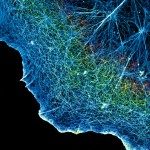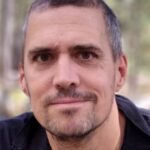Link to Pubmed [PMID] – 33649340
Link to DOI – 10.1038/s41467-021-21585-7
Nat Commun 2021 Mar; 12(1): 1352
Local translation allows for a spatial control of gene expression. Here, we use high-throughput smFISH to screen centrosomal protein-coding genes, and we describe 8 human mRNAs accumulating at centrosomes. These mRNAs localize at different stages during cell cycle with a remarkable choreography, indicating a finely regulated translational program at centrosomes. Interestingly, drug treatments and reporter analyses reveal a common translation-dependent localization mechanism requiring the nascent protein. Using ASPM and NUMA1 as models, single mRNA and polysome imaging reveals active movements of endogenous polysomes towards the centrosome at the onset of mitosis, when these mRNAs start localizing. ASPM polysomes associate with microtubules and localize by either motor-driven transport or microtubule pulling. Remarkably, the Drosophila orthologs of the human centrosomal mRNAs also localize to centrosomes and also require translation. These data identify a conserved family of centrosomal mRNAs that localize by active polysome transport mediated by nascent proteins.


